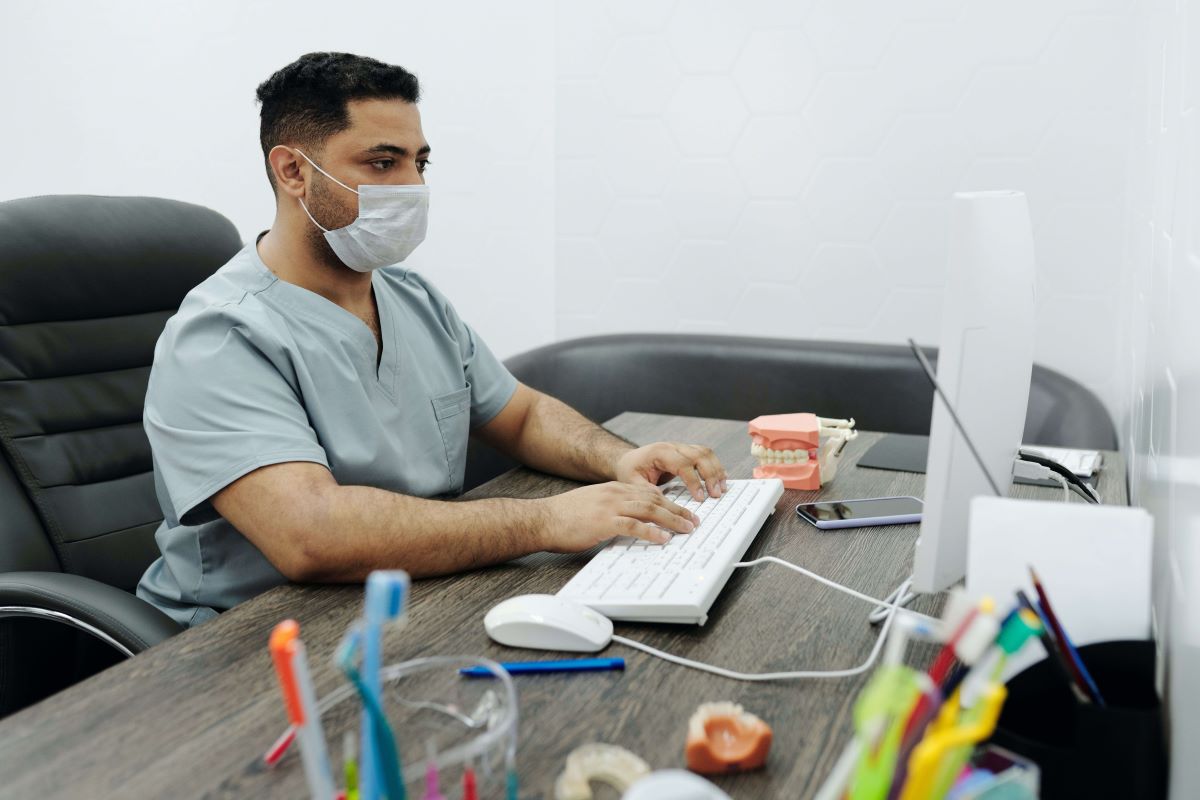Medical assistants play a crucial role in healthcare facilities by providing support to physicians, nurses, and other healthcare professionals. They perform a variety of administrative and clinical tasks that are vital for the smooth functioning of medical practices. To excel in this field, it is essential to possess a diverse range of skills. In this blog, we will explore 19 must-have medical assistant skills that are essential for success in this profession.
Among other important skills, medical assistants must know how to effectively communicate, work together, solve diverse problems, multitask, and navigate a laboratory.
1. Communication Skills
Effective communication is at the core of every medical assistant's role. Medical assistants must be able to communicate clearly and professionally with patients, colleagues, and healthcare providers. They should have strong verbal and written communication skills to convey information accurately and empathetically. Clear communication helps ensure patient understanding, fosters trust, and facilitates efficient coordination within the healthcare team.
2. Interpersonal Skills
Building strong interpersonal relationships is key to providing quality patient care. Medical assistants need to have excellent interpersonal skills to interact compassionately with patients from diverse backgrounds. Empathy, active listening, and the ability to remain calm and composed under pressure are essential in establishing a supportive and caring environment.
3. Organizational Skills
Medical assistants are responsible for managing administrative tasks and maintaining organized medical records. They must possess excellent organizational skills to handle appointments, manage paperwork, and ensure the smooth flow of patient information. Being organized helps medical assistants stay efficient, reduce errors, and maintain confidentiality.
4. Attention to Detail
In healthcare, attention to detail is crucial to ensure accurate record-keeping and patient safety. Medical assistants must pay close attention to details when documenting patient information, administering medications, or performing laboratory procedures. Precision and diligence are essential to avoid errors that could have severe consequences.
5. Technical Skills
Proficiency in using various medical equipment and technology is vital for medical assistants. They should be comfortable using electronic health record (EHR) systems, medical billing software, and diagnostic equipment. Staying up-to-date with the latest technology and adapting to new tools are essential for providing efficient patient care.
6. Medical Knowledge
Medical assistants need a solid foundation of medical knowledge to understand medical terminology, anatomy, and basic diagnostic procedures. They should be familiar with common medical conditions, medications, and treatment protocols. Continuous learning and staying updated with medical advancements help medical assistants deliver quality care.
7. Time Management Skills
In a fast-paced healthcare environment, time management is crucial. Medical assistants must efficiently handle multiple tasks, prioritize responsibilities, and meet deadlines. Effective time management ensures that patient needs are met promptly and clinic operations run smoothly.
8. Multitasking Abilities
Medical assistants often find themselves juggling various responsibilities simultaneously. They should be able to multitask efficiently without compromising the quality of care. From scheduling appointments to taking vitals, medical assistants need to balance multiple tasks while remaining focused and organized.
9. Professionalism
Maintaining a professional demeanor is essential for medical assistants. They should adhere to ethical standards, maintain patient confidentiality, and demonstrate integrity in all interactions. Professionalism fosters trust among patients and colleagues, and it contributes to a positive work environment.
10. Problem-Solving Skills
Medical assistants encounter diverse challenges in their daily work. They must be able to think critically and find solutions to problems efficiently. Strong problem-solving skills enable medical assistants to handle unexpected situations, adapt to changes, and provide the best possible care to patients
11. Flexibility and Adaptability
Healthcare settings can be unpredictable and dynamic. Medical assistants must be flexible and adaptable to accommodate changing priorities, work schedules, and patient needs. The ability to adjust quickly to new situations and work collaboratively as part of a team is crucial in delivering efficient healthcare services.
12. Infection Control Knowledge
Maintaining a safe and hygienic environment is a top priority in healthcare. Medical assistants should have a solid understanding of infection control protocols, such as hand hygiene, proper disposal of medical waste, and sterilization techniques. Adhering to these guidelines helps prevent the spread of infections and ensures patient and staff safety.
13. Basic Laboratory Skills
Medical assistants often assist in laboratory procedures, such as collecting and processing specimens. Basic knowledge of laboratory techniques, including handling samples and performing routine tests, is valuable. Understanding laboratory protocols and accurately interpreting results are essential skills for medical assistants.
14. Customer Service Skills
Providing exceptional customer service is vital in the healthcare industry. Medical assistants should be friendly, approachable, and responsive to patient needs and concerns. A positive and compassionate attitude helps create a welcoming environment and contributes to patient satisfaction.
15. Basic Pharmacology
Medical assistants may be involved in administering medications or providing patients with medication-related information. Having a basic understanding of pharmacology, including drug classifications, dosage calculations, and potential side effects, enables medical assistants to offer accurate support to patients and healthcare providers.
16. Vital Signs Assessment
Measuring and documenting vital signs, such as blood pressure, heart rate, and temperature, is a fundamental task for medical assistants. They should be skilled in accurately assessing and recording these vital signs to assist healthcare professionals in evaluating patients' overall health.
17. First Aid and CPR
Medical assistants should be certified in first aid and cardiopulmonary resuscitation (CPR). Knowledge of these life-saving techniques equips medical assistants to respond effectively in emergencies and provide immediate assistance to patients until further medical help arrives.
18. Medical Coding and Billing
Understanding medical coding and billing processes is essential for medical assistants involved in administrative tasks. Knowledge of coding systems, insurance policies, and claim submission procedures helps ensure accurate billing and reimbursement, reducing financial burdens for patients and healthcare providers.
19. Continuous Learning
Medical assistants should have a thirst for knowledge and a commitment to lifelong learning. Staying informed about the latest medical advances, attending conferences, and pursuing further education opportunities enhances their skills and keeps them up-to-date with industry trends.
What Does a Medical Assistant Do Each Day?
As we explore the must-have skills for medical assistants, it is equally important to understand what their daily responsibilities entail. A medical assistant's role may vary depending on the healthcare setting, but their duties typically encompass both administrative and clinical tasks. Let's delve into a typical day in the life of a medical assistant.
Administrative Tasks
One of the key responsibilities of a medical assistant is managing administrative duties that ensure the smooth operation of a healthcare facility. These tasks often include:
- Scheduling Appointments:Medical assistants schedule patient appointments, ensuring proper allocation of time for each visit. They coordinate with patients, healthcare providers, and other staff members to maintain an organized schedule.
- Greeting and Registering Patients: Medical assistants are often the first point of contact for patients. They greet and register patients, collect necessary information, and update medical records accurately.
- Insurance Verification: Verifying patients' insurance coverage is crucial for efficient billing and reimbursement processes. Medical assistants confirm insurance details, eligibility, and obtain necessary authorizations to facilitate smooth financial transactions.
- Maintaining Medical Records: Medical assistants are responsible for maintaining patient medical records, ensuring they are accurate, up-to-date, and confidential. They organize files, enter data into electronic health record (EHR) systems, and retrieve records as needed.
- Billing and Coding: Medical assistants may assist in coding procedures and diagnoses for accurate billing. They may also help prepare and submit insurance claims, ensuring adherence to coding guidelines and compliance regulations.
Clinical Tasks
In addition to administrative duties, medical assistants often provide clinical support to healthcare professionals. Some of their clinical responsibilities include:
- Taking Vital Signs:Medical assistants measure and record vital signs such as blood pressure, heart rate, temperature, and respiratory rate. These measurements provide crucial information for healthcare providers in assessing patients' overall health.
- Assisting with Patient Examinations: Medical assistants prepare examination rooms, ensuring they are clean, organized, and stocked with necessary supplies. They assist healthcare providers during patient examinations, providing support and necessary instruments.
- Collecting Specimens:Medical assistants may collect and process specimens for laboratory testing. They ensure proper labeling, documentation, and transportation of samples, following established protocols and maintaining infection control standards.
- Administering Medications: Under the direction and supervision of healthcare professionals, medical assistants may administer medications, injections, or vaccinations. They follow appropriate protocols and maintain accurate records of medication administration.
- Conducting Basic Laboratory Tests: Conducting Basic Laboratory Tests: Medical assistants may perform basic laboratory tests such as urinalysis, blood glucose monitoring, or electrocardiograms (ECGs). They ensure proper specimen collection and handle equipment according to safety guidelines.
- Patient Education: Medical assistants play a vital role in patient education. They provide instructions for medication usage, assist in explaining medical procedures, and offer general health information to patients, promoting wellness and disease prevention.
- Assisting in Minor Procedures:Medical assistants may assist healthcare providers during minor surgical procedures, ensuring a sterile environment, preparing instruments, and providing support to both the patient and the healthcare professional.
Get Started in Medical Assistance Today
A medical assistant's daily routine is a combination of administrative tasks and clinical responsibilities that contribute to the efficient operation of a healthcare facility. From managing appointments and medical records to providing direct patient care and assisting healthcare providers, medical assistants play a crucial role in the overall healthcare experience. By possessing the must-have skills discussed in this blog and excelling in their daily tasks, medical assistants can make a positive impact on patient outcomes and ensure the smooth functioning of medical practices.
It’s also important to consider a wide variety of potential healthcare careers before deciding on the path of a medical assistant. For example, many students choose to become nurses, physician’s assistants, CNAs,or phlebotomists. Others might choose to becomepatient care technicians. Make sure that the bootcamp program you choose affirms your continued interest in medical assistance as a viable career field.
Being a medical assistant requires a diverse skill set that encompasses clinical, administrative, and interpersonal abilities. The 19 must-have skills discussed in this blog highlight the essential competencies for success in this profession. However, choosing the right medical assistant certification program can be a challenge. Fortunately, Best Bootcamps can help aspiring medical assistants identify the best medical assistant bootcamp options that accommodate their budget, study habits, lifestyle, and other important decision-making factors. By choosing the right program and continually honing their skills, medical assistants can excel in their roles and contribute to the well-being of patients and healthcare facilities alike.
If you're considering a career as a medical assistant, visit Best Bootcamps today to find the perfect medical assistant certification program for you. Their comprehensive platform will assist you in identifying bootcamp options that suit your specific needs, ensuring you receive the best education and training possible. Start your journey to becoming a skilled and successful medical assistant today!




